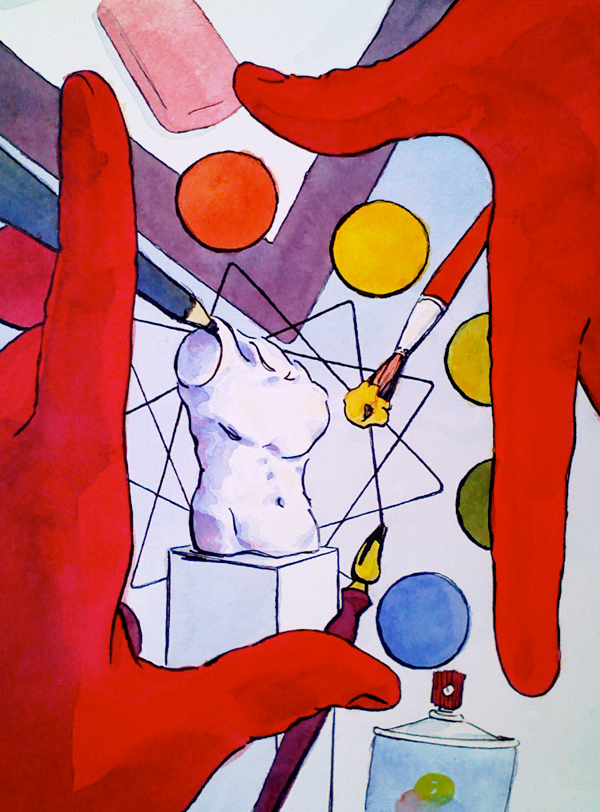Serious Like an Art Attack
that funny feeling we feel when we try to talk about art
Mike Paulus, illustrated by Ian Kloster |

I have never received any kind of training in art appreciation. When I see a piece of visual art that I enjoy, for whatever reason, on whatever level, I don’t take the time to really analyze the situation. I don’t say much. I don’t explode out the front doors of the art gallery to grab the first pedestrian I see, tossing them inside while screaming, “Trust me, you jus’ gotta see THIS ART!”
I mostly just stare. Maybe I’ll softly grunt and point if I’m feeling especially moved.
But I’m not a jump up and down and buy a ticket to Bonkers Town kind of guy when I get excited about something, and I believe that I’m in the majority of Midwesterners in how I react to the the stuff I like. It’s more of an inward experience. I wish it were different, as I think it’s important to share the things that make you happy and engaged – freely, when appropriate – but this is how I am.
So when I happen to find myself in front of a piece of visual art, I often feel the strange need to talk about it, despite my natural inclination to clam up. As a compromise, I usually end saying inane things like Hey, look at this one, or Huh, check it out. I like that, or the ever-present, all-purpose, super-meaningless That’s cool.
For many people, it’s hard to overcome the perception that one needs to have already practiced understanding art before you can even look at anything more complex than a funny T-shirt.
I understand you don’t need formal training or academic study to enjoy, discuss, or even analyze visual art, but for many people, it’s hard to overcome the perception that one needs to have already practiced understanding art before you can even look at anything more complex than a funny T-shirt. No one wants to sound dumb, or pretentious, or full of crap. Or all of the above.
And to be honest, most people I’ve heard talking about art sound like all of the above. I do not want to be that guy.
I think part of the problem is that many people – especially people who don’t actively create art themselves – aren’t sure how do define what may or may not be art, and they feel uneasy in trying to do so, like it’s some kind of test. So many things are called art, from the goofy lawn ornaments your Uncle Jed paints to the hundred-year-old paintings on which anonymous buyers are always spending hundreds of thousands of dollars. But there’s a prevailing notion that some things are “real art” and other things are just stuff someone makes.
In Scott McCloud’s critically acclaimed comic book series about comics, Understanding Comics, he takes a stab at answering the question “What is art?” in one sentence. He says art is, “Any human activity which doesn’t grow out of either survival or reproduction.”
I believe he’s casting an unfathomably wide net on purpose, indicating that in most contexts, “What is art?” is the wrong question. The right question is perhaps, “What has this art done to you (if anything)?” Have you thought more about something? Felt more about something? Has it actually changed you in some way?
People always talk about “transformative” art as being the really, really good stuff. I tend to agree. Art that simply communicates an idea or makes you sad or makes you laugh out loud is great, but if someone is able to actually change you or cause a group of people to do something new ... you’ve really got something.
Do we see a lot of truly transformative art in the Chippewa Valley – art that challenges us to change? I’m apprehensive about saying this, but my gut says, “No, not a lot.” But my gut rarely talks about art, so take that with a grain of salt. It usually just makes small talk.
I’m not saying it’s not there. It is. I just think it’s harder to find. I have a feeling that the majority of the area’s art appreciators are not people who do it on a regular basis. They do not actively seek out visual art as a vital part of their lives, so finding the really, really good stuff is a rare occurrence. And yet I think we all honestly appreciate it when we happen across something that transcends basic emotional reactions. I wish we had more of that. I’m really not sure why we don’t, but I’m betting the more we’re able to talk about it, the more we’ll end up seeing.






















